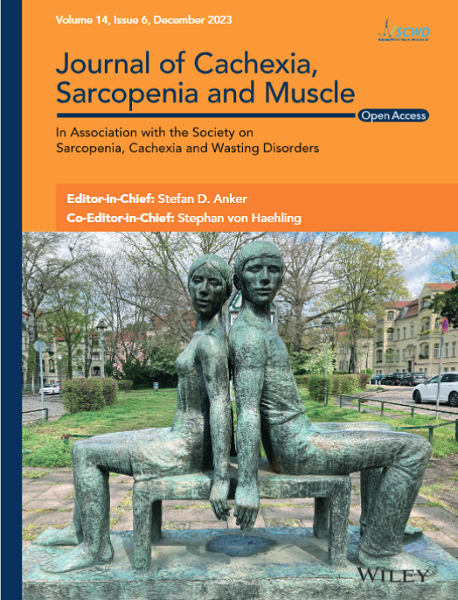Hydrogen sulfide (H2S), the third gasotransmitter discovered, regulates a variety of physiological functions. Whether H2S alleviates skeletal muscle ageing by regulating autophagy has not been reported.
Mice were administered 150 mg/kg/day of D-galactose (D-gal), and C2C12 myotubes were cultured in 20 g/L D-gal to induce ageing. Sodium hydrosulfide (NaHS) was employed as an exogenous donor in the treatment group. The intracellular concentration of H2S was quantified by the 7-azido-4-methylcoumarin fluorescence probe. The proteins involved in the ubiquitin-mediated degradation of AMPKα1 were detected by liquid chromatography tandem mass spectrometry (LC–MS/MS) and co-immunoprecipitation (Co-IP). S-sulfhydration of USP5 was tested by a biotin-switch assay. Associated proteins were analysed by western blot.
NaHS was found to effectively restore the H2S content in both ageing gastrocnemius (+91.89%, P < 0.001) and C2C12 myotubes (+27.55%, P < 0.001). In comparison to the D-gal group, NaHS was observed to increase the mean cross-sectional area of muscle fibres (+44.91%, P < 0.001), to decrease the collagen volume fraction of gastrocnemius (−81.32%, P = 0.001) and to reduce the β-galactosidase-positive area of C2C12 myotubes (−28.74%, P < 0.001). NaHS was also found to reverse the expression of muscle atrophy F box protein (MAFbx), muscle-specific RING finger protein 1 (MuRF1), Cyclin D1 and p21 in the ageing gastrocnemius tissue (MAFbx: −31.73%, P = 0.008; MuRF1: −32.37%, P = 0.003; Cyclin D1: +45.34%, P = 0.010; p21: −25.53%, P = 0.022) and C2C12 myotubes (MAFbx: −16.38%, P < 0.001; MuRF1: −16.45%, P = 0.003; Cyclin D1: +40.23%, P < 0.001; p21: −35.85%, P = 0.026). The AMPKα1–ULK1 pathway was activated and autophagy was up-regulated in NaHS-treated gastrocnemius tissue (p-AMPKα1: +61.61%, P = 0.018; AMPKα1: +30.64%, P = 0.010; p-ULK1/ULK1: +85.87%, P = 0.005; p62: −29.07%, P < 0.001; Beclin1: +24.75%, P = 0.007; light chain 3 II/I [LC3 II/I]: +55.78%, P = 0.004) and C2C12 myotubes (p-AMPKα1: +77.49%, P = 0.018; AMPKα1: +26.18%, P = 0.022; p-ULK1/ULK1: +38.34%, P = 0.012; p62: −9.02%, P = 0.014; Beclin1: +13.36%, P < 0.001; LC3 II/I: +79.38%, P = 0.017; autophagy flux: +24.88%, P = 0.034) compared with the D-gal group. The effects of NaHS on autophagy were comparable to those of acadesine and LYN-1604, and chloroquine could reverse its effects on ageing. LC–MS/MS and Co-IP experiments demonstrated that USP5 is a deubiquitinating enzyme of AMPKα1. Following the knockdown of USP5, the activation of AMPKα1 was decreased (p-AMPKα1: −42.10%, P < 0.001; AMPKα1: −43.93%, P < 0.001), autophagy was inhibited (p-ULK1/ULK1: −27.51, P = 0.001; p62: +36.00, P < 0.001; Beclin1: −22.15%, P < 0.001) and NaHS lost its ability to up-regulate autophagy. NaHS was observed to restore the expression (gastrocnemius: +62.17%, P < 0.001; C2C12 myotubes: +37.51%, P = 0.003) and S-sulfhydration (+53.07%, P = 0.009) of USP5 and reduce the ubiquitination of AMPKα1.
H2S promotes the deubiquitination of AMPKα1 by increasing the expression and S-sulfhydration of USP5, thereby up-regulating autophagy and alleviating skeletal muscle ageing.



